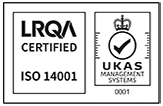At Rabbit Group, we are proud to say that our greatest aim is to keep our processes as green as possible.
Part of this includes the fact that we recycle everything we can from our skips and have a power plant facility onsite which is able to take biomass waste and convert it into renewable electricity.
In our efforts to recycle materials, however, there’s always the chance that something could find its way into the waste which shouldn’t be there. Some of these products pose a significant fire risk and therefore harm to our operation and damage to buildings and equipment, as well as the potential to cause environmental pollution.
Dispose of batteries correctly
Batteries are used everywhere – in homes and businesses all over the world. But it’s vital they are never thrown away in household waste, or skips. Instead, there is a specific way to dispose of them. The reason for this is because, if punctured, damaged or exposed to high temperatures, during the normal waste management process, batteries can easily combust, releasing their stored energy and starting fires which can burn with significant, ferocious force.
When these fires take place around combustible materials, such as waste, the results can be rapid and catastrophic.
To combat the risk of fire, we have robust fire prevention and detection systems within our power plant and materials recovery facility. This state of the art fire suppression system measures the temperature of the waste, looking for unusually hot spots. If the temperature rises and stays at the same high temperature, then foam cannons are automatically released to stop the flames from spreading.
We believe it is vital that the general public and businesses are better educated about the significant damage which can be caused by discarding batteries in an improper way.
It’s not only the risk of fire which poses such a big problem, either. The hazardous chemicals which are contained within batteries can also be extremely damaging to the environment, if allowed to get into water or soil.
Where can I recycle batteries?
Batteries, in particular lithium-ion batteries, have the ability to cause very intense fires that can rapidly spread through large volumes of material. They’re found commonly in electronic equipment and, more recently, in electric vehicles. Therefore, if throwing away an electrical product, it’s vital that you remove the batteries first and recycle them correctly.
Most retailers that sell batteries will also recycle them. That’s because legislation came into effect in 2010 meaning that shops that sell more than 32kg of batteries a year (that’s about 345 four-packs of AA batteries) must provide battery recycling collection facilities in-store.
In addition, batteryback.org has deposit points all over the country to make battery disposal as easy as possible.
How are batteries recycled?
If you take your batteries to a batteryback.org drop-off for recycling, your batteries will eventually end up in a plant in Belgium. Here, alkaline and zinc-carbon batteries are sorted, crushed and screened. Then they are chemically treated, through a process of washing, filtration, an acid attack and more filtration to separate out the individual chemicals.
Always remember to remove and recycle batteries. For more information about recycling, or the skip hire services that we provide in Sussex, Surrey and Hampshire, contact us on 01903 762020 or email info@rabbitgroup.co.uk.





